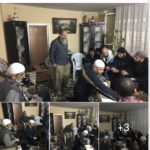A Turkish court acquitted a jihadist who went to fight in Syria, part of the government’s revolving door policy in the criminal justice system that consistently fails to crack down on al-Qaeda and the Islamic State in Iraq and Levant the (ISIL).
The suspect is a 20-year-old man who was radicalized in Turkey’s southeastern border province of Adana by jihadist outfits that operate under the cover of NGOs with the full knowledge of authorities. Mahmut Ortaç, a resident of the town of Seyhan in Adana province, crossed into Syria illegally in June 2017 and spent time there with jihadist groups.
Some of the social media messages shared by Ortaç under the assumed name of Sad Bin Muaz.
The authorities were made aware of his jihadist connections when his mother, Yüsra Ortaç, filed a missing persons report with the local police station (the Dağlıoğlu Şehit Mehmet Ali Aslan unit) in Seyhan on June 1, 2017. The next day she provided more information about her son’s links to radicals, displaying his social media messages on Facebook. According to the report, Ortaç left home on May 31, 2017 without telling his parents anything. The Adana Chief Public Prosecutor’s Office launched an investigation into Ortaç and his associates.

After a three-month-long probe, a detention warrant was issued for him on Sept. 11, 2017 by the Adana 6th Penal Court of Peace under ruling No. 2017/169. He was detained 10 days later as he was trying to return to Turkey via the Cilvegözu border gate on the Turkish-Syrian border. But he was not formally arrested and was released pending trial on Sept. 28, 2017.
In his statements to the police and prosecutor, Ortaç provided conflicting accounts of how and why he went to Syria. Although he claimed he went for Eid al-Adha celebrations, the date he first crossed into Syria was three months before the religious holiday. He failed to provide a full accounting of where he had stayed while in Syria as well. He initially claimed he had stayed at his friend Murat Çakır’s house in Turkey after leaving home, but Çakır disputed the account when questioned by police. Later he claimed he stayed at a hotel, but the database for Adana hotels did not show him as having checked in to any hotel, either. In his court hearings he admitted he lied to investigators because he said he was very much afraid when he was detained.
A review of Ortaç’s Facebook account shows him to be a radicalized young man. He claimed in his defense that he accessed his Facebook account from an Internet café and might have forgotten to log out, allowing others to use his account without his permission to share jihadist messages. That contradicted his parents’ initial account when they filed a missing persons report.
Ortaç also befriended known jihadist figures such as Hasan Süslü, Davut Daşkıran and Recep Baltacı after they invited the young man to contact them through social media. Süslü was detained on Jan. 13 for recruiting militants for Hay’at Tahrir al-Sham (HTS), also known as al-Qaeda in Syria. Süslü leads a front NGO called the Aid and Solidarity Association for the Poor (Fukara Yardımlaşma ve Dayanışma Derneği, or Fukara-Der), which was set up on Sept. 11, 2013 in the city of Seyhan. The NGO provides logistical support to jihadist groups and their families and supplies goods and services on demand from the ground in Syrian cities such as Idlib, Jarablus, al-Bab and other places in the north of Syria where jihadist groups have been operating. Fukara-Der is the subject of an investigation in the Netherlands, where partner Islamist NGOs were alleged to have funneled funds to jihadist groups in Syria.

Ortaç admitted that he followed the sermons of Feyzullah Birişık and frequented meetings held at the Rahmet Derneği. He said he did not know that the association was linked to terrorism and denied any knowledge of Hay’at Tahrir al-Sham. Birişık is a radical cleric who has been advocating armed jihad for years. He was tried and convicted in an al-Qaeda case in 2007 and sentenced to six years, three months in prison after an investigation was launched into Turkish cells following twin al-Qaeda attacks in Istanbul in 2003 that killed 59 people. After the appeals court overturned the verdict against him in 2009, he was retried and acquitted in April 2013 due to a lack of evidence. Birişık was detained in Bursa province on Aug. 30, 2016 on terrorism charges and released pending trial by the court on Sept. 6, 2016.

A Turkish prosecutor indicted Ortaç on charges of membership in al-Qaeda on Jan. 9, 2018. During a hearing held at the Adana 3rd High Criminal Court on March 13, 2018, judges Eray Doğan, Ramazan Yurteri and Çağrı Burak Türk ruled unanimously for his acquittal on the grounds that the suspect had denied the charges and ordered the government to cover the cost of court proceedings and attorney’s fees.
Ortaç was represented by lawyer Mustafa Kocamanbaş, an Islamist attorney known for extremist views who often takes on cases of al-Qaeda and ISIL suspects in Turkey. He also represents Süslü and many other known jihadist figures in Turkey’s border provinces.





















